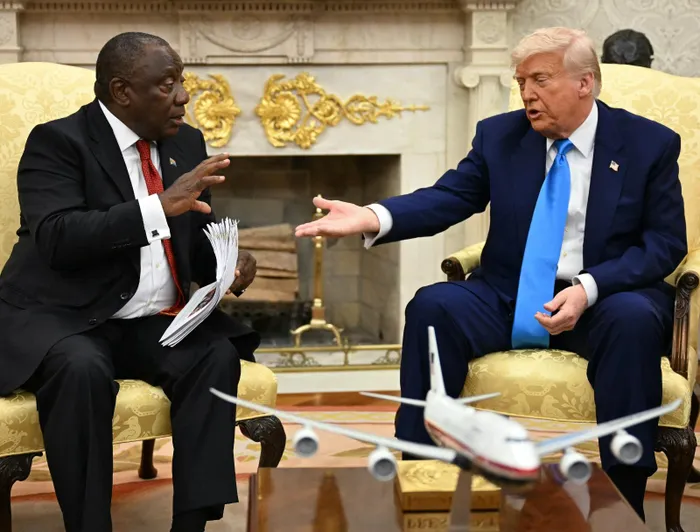
Relations between Pretoria and Washington D.C. have increasingly grown hostile of late, with Trump offering refugee status to white Afrikaner fleeing a perceived but not proven “white genocide” in South Africa.
Image: AFP
The Business 20 (B20) South Africa has expressed confidence in negotiations between South Africa’s government and the United States amidst freezing diplomatic and trade relations ahead of the G20 Summit to be held in Johannesburg later in the year.
This comes as US President Donald Trump said on Tuesday he might skip the upcoming Group of 20 (G20) leaders' summit in South Africa in November and send someone else to represent the United States, citing his disapproval of South African policies.
B20 Sherpa, Cas Coovadia, said on Wednesday they were ramping up efforts to foster collaboration among nations, with the US taking a central role.
Coovadia said recent discussions led by B20 representatives have underscored the undeniable significance of American business participation, culminating in proactive engagement with the American Chamber of Commerce in Washington.
“Firstly, just to say that American business, as well as the American Chamber of Commerce in Washington, has been very supportive of the B20. We've got C-suite American business people on the task forces. We've got some as co-chairs on Task Forces,” Coovadia said.
“I've been in constant contact with the American Chamber of Commerce, and their point person for the B20 has been participating in relevant meetings. So, that is not just waiting until the end of the year to hand over, but we've been working very closely with them.
“So, businesses in America are quite clear that the B20 is important, that the G20 is important, that we need to collaborate to actually make a difference in this world.”
The anticipation of Trump’s attendance at the forthcoming G20 Summit remains palpable, signalling crucial political discussions that hold the potential to shape collaborative economic initiatives.
Relations between Pretoria and Washington D.C. have increasingly grown hostile of late, with Trump offering refugee status to white Afrikaner fleeing a perceived but not proven “white genocide” in South Africa.
The Trump administration will be implementing a hefty 30% import tariffs on most products coming from South Africa beginning on Friday and has refused to give any feedback on the Framework proposed by South Africa.
The US-South Africa Bilateral Relations Review Act of 2025 has also passed the House Foreign Affairs Committee, and if approved, it would sanction the South African government for an alleged anti-American agenda and debatable claims of persecution of white citizens.
“Obviously, our government is interacting with the US government on their involvement in the G20. I do know, for instance, that the finance governor and minister staff work streams in Zimbali about two weeks ago. The US was present, although at a technical level, they were present. And we hope that President Trump does actually attend,” Coovadia said.
“And we're all clear that we need to collaborate to grow inclusive economies and address the challenges that the world has. America engages for about 15% of global trade. The B20 is working to make sure that the other 85% collaborates and works together. And we would hope that the US joins that effort. And we would certainly encourage President Trump to be present at the G20 Summit.
“But ultimately, it's a discussion, political discussion, between our governments. And we'll see what happens. But certainly from a B20 point of view, we think the involvement of the American government at a high level is important.”
Meanwhile, Debra Mallowah, the chair of the Sustainable Food System and Agriculture Taskforce, urges urgent action to secure global food systems.
Mallowah highlighted that the repercussions of inadequate food supply chains were not just hypothetical; they were already manifesting and accelerating across the globe.
She said currently, one in 10 people globally goes hungry, and the rising cost of food is putting incredible strain on households around the world.
“What if today the cost of your daily bread tripled? What if your supermarket shelves were suddenly empty, not due to local issues like war or drought, but because of supply chain breakdowns thousands of miles away? This is not a distant problem; rather, it is a looming crisis that affects everyone, irrespective of their location or socio-economic status,” Mallowah asked.
“Food security is not merely a humanitarian concern. It is also a pressing economic, national security, and climate issue.
Mallowah said that Africa, often viewed through the lens of struggle, was also positioned uniquely to offer solutions.
She said Africa possesses 60% of the world’s uncultivated arable land and is home to millions of smallholder farmers—70% of the continent's food is produced by these farmers, many of whom are women. Yet, despite their crucial role, they face barriers such as limited access to finance, markets, infrastructure, and technology.
BUSINESS REPORT
Related Topics: